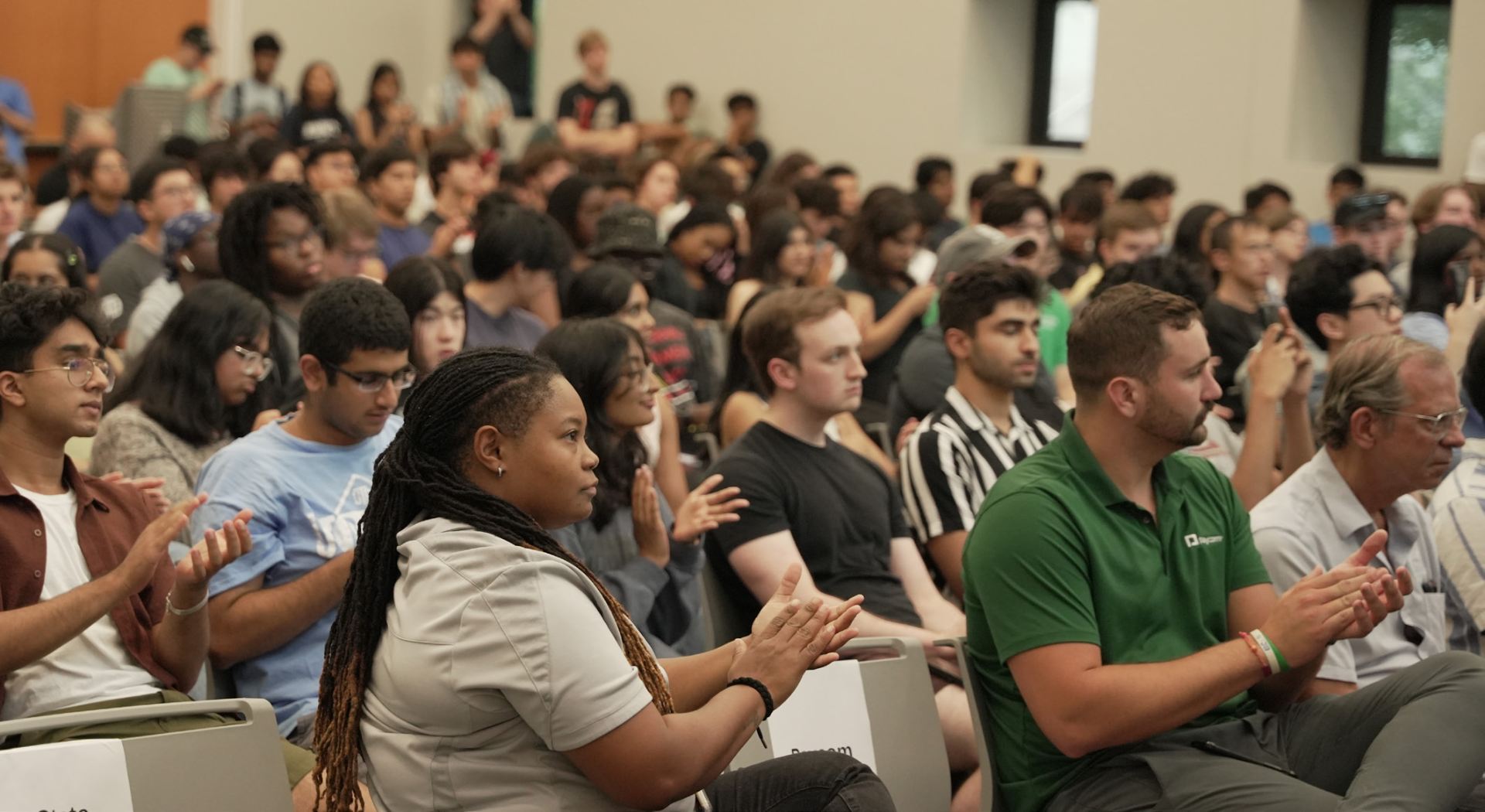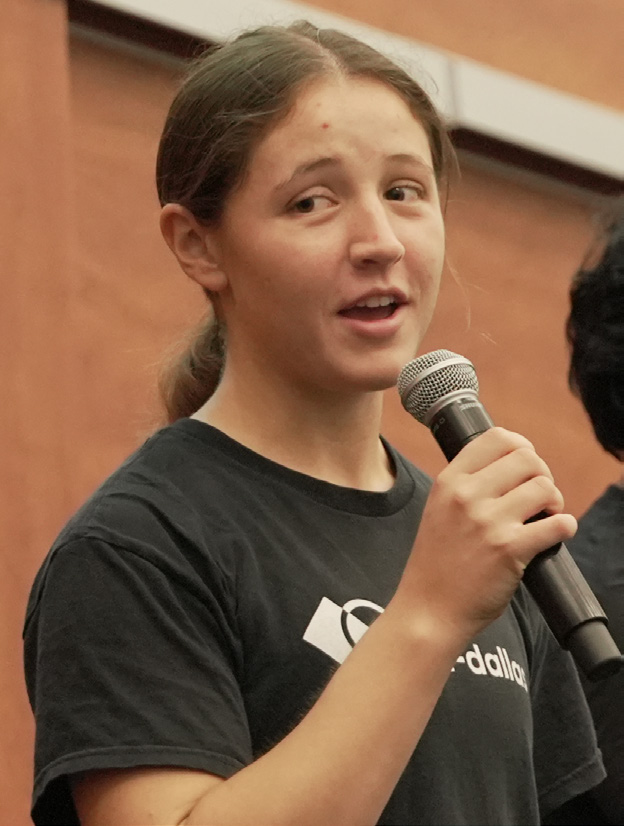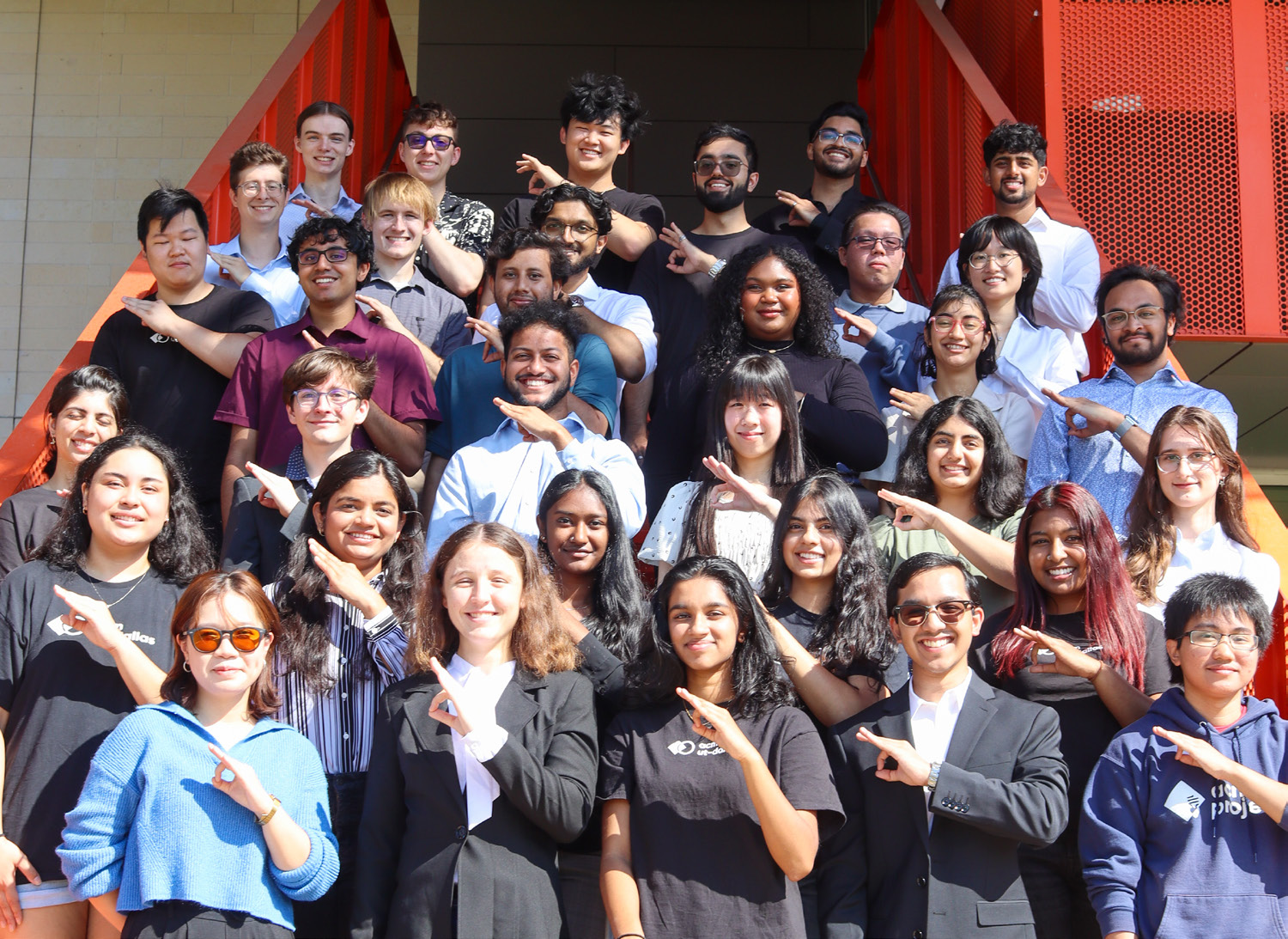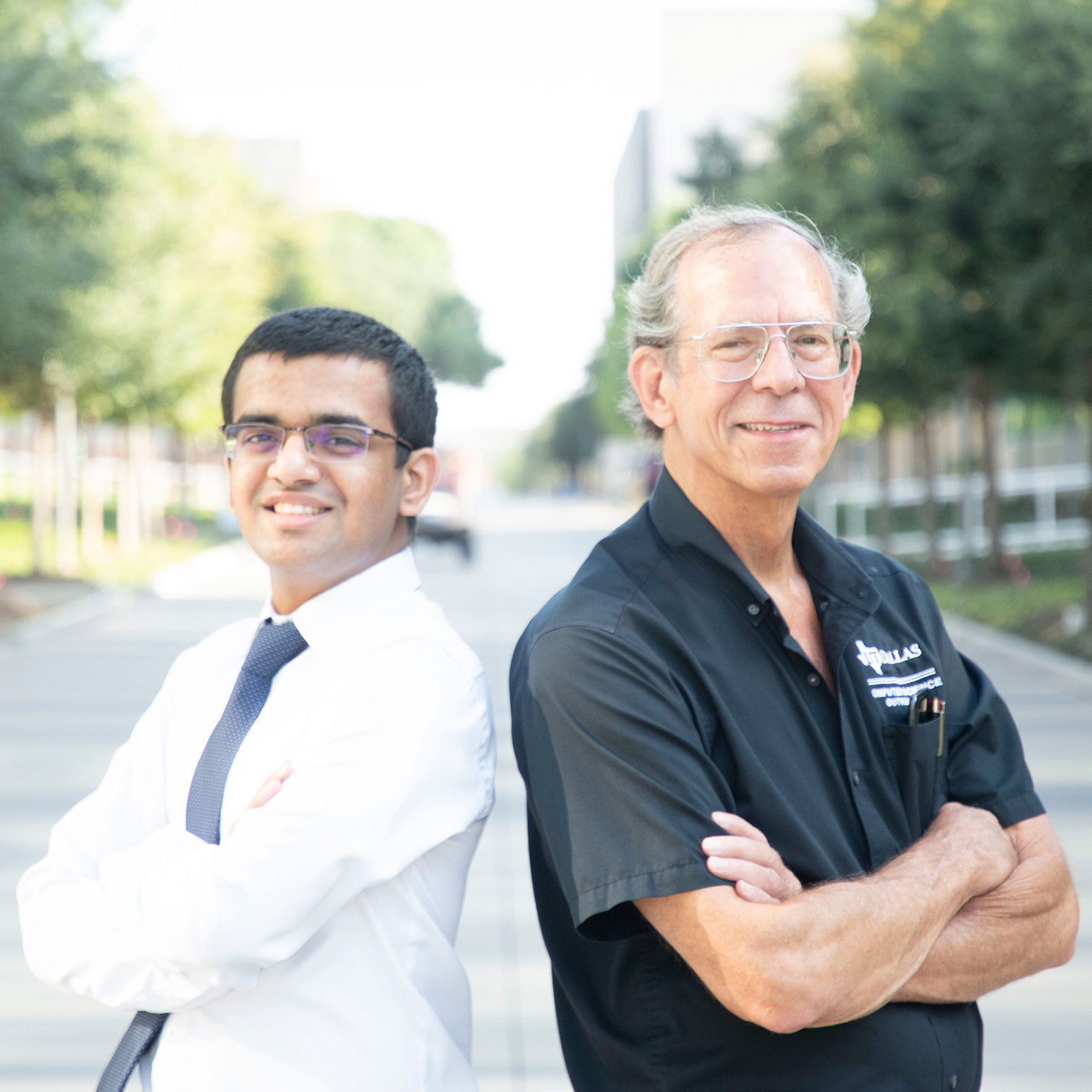UT DALLAS CHAPTER OF ACM EARNS INTERNATIONAL RECOGNITION,
HOSTS TOP-RANKED HACKATHON

More than 500 students attended the fall 2023 kickoff event of the UT Dallas chapter of the Association for Computing Machinery (ACM). Representatives from several companies introduced themselves and discussed upcoming recruitment opportunities.
Computer science and software engineering are fields well-suited to introverts with hours spent coding and designing, but that doesn’t mean students majoring in these fields are isolated at The University of Texas at Dallas. One in six students is enrolled in the Department of Computer Science.
Through the UT Dallas chapter of the Association for Computing Machinery (ACM), students find professional resources as well as a social outlet where they can connect with hundreds of other like-minded students and have numerous opportunities to expand their skills. Because of the group’s strategic efforts, they were one of five top-performing student chapters to receive an ACM Excellence Award in 2023.
“The ACM student organization, housed within the Department of Computer Science in the Erik Jonsson School of Engineering and Computer Science, has been for years a consequential driving force for student engagement,” said Dr. Ovidiu Daescu, head of the Department of Computer Science, professor of computer science and Jonsson School Chair. “The organization hosts a plethora of computing-related activities, including organizing hackathon events and industry presentation nights, driving sponsorship of events, promoting research through self-guided and faculty-guided research projects and contributing to student scholarship support.”
The organization has expanded its programming over the past 12 years in order to help students connect more meaningfully with each other, with faculty and with future employers thereby supporting the goals of the University and the organization itself.
“ACM’s official mission statement at our chapter is to build a greater, more collaborative computing community at UTD,” said Jocelyn Heckenkamp, computer science senior and president of ACM. “I chose UTD because it seemed like it had the nerdiest culture, and ACM has been such a big part of my experience.”

Jocelyn Heckenkamp, senior computer science major, has served as ACM president in 2023 in addition to studying abroad and attending military training in the summer. Heckenkamp says the experience has helped to prepare her for leadership roles in her future career.
INTERNATIONAL EXCELLENCE
Worldwide, ACM includes roughly 100,000 members, more than half of whom reside outside the United States. More than 500 colleges and universities participate in ACM chapters. Just five ACM Excellence Awards are designated for top-performing student chapters each year, and the UT Dallas team was recognized specifically for Outstanding Service.
Heckenkamp identified four main programs where the group excels: ACM Projects, ACM Research, ACM Technical Interview Prep and the ACM Mentor Program. All except for the mentor program are competitive — students must apply and may participate just one semester for most programs.
“ACM gives us the chance to be more creative — we’re not limited by the course content,” Heckenkamp said. “You can work on whatever project you want.”
ACM Projects organizes teams of four to five students who complete a software project over the course of 10 weeks, then present their work to a panel at a competitive presentation night. ACM Research is a 10-week research program that connects student teams of four to five with research professors, and students participate in a poster competition at the end of the semester. ACM Technical Prep provides in-depth instruction in data structures, algorithms, technical interview questions and interview practice. Students conclude the program by participating in a mock interview. Finally, the ACM Mentor Program connects junior- and senior-level students with first-year students to provide them with advice on classes, the college experience and internships.
The UT Dallas chapter of ACM reports more than 600 members and more than 100 student leaders dedicated to organizing events. They also organize HackUTD, one of the largest hackathons in the region, and participate in tech talks and volunteer events.
“I found a community in ACM. I felt like I belonged,” said Saksham Sangraula BS’23, former ACM president and recent computer science graduate. “At its core, ACM is a student organization, and students are trying to have fun, be together and learn. I had to remember not to take the job too seriously, that I was volunteering, even though I was effectively running a large organization.”
ACM at UT Dallas is not simply a place for professional networking, Sangraula said. The group also seeks to build a series of social events to help students connect and unwind. The group has dedicated space in the Engineering and Computer Science South building and even publishes its own yearbook. Hundreds of students attended the organization’s kickoff meeting in August 2023, so student leaders could have a unique opportunity to leverage their public speaking and leadership skills.
“I am planning to go into the military, and ACM has prepared me for that in a way with the leadership challenges and leading such a huge group of people,” Heckenkamp said.

The 2023 ACM officers include (top row, from left): Solomon Pierce, Nick Burnett, Michael Zhao, Farhan Jamil, Fatin Chad, Aswhin Ravishankar, (second row, from left): David Tepeneu, Michael Hellman, Ridwan Amin, Mike Nguyen, Susan Zhang, (third row, from left): Ben Wang, Naveen Mukkatt, Faisal Hasan, Shannon Carter, Karina Batra, Siddhant Patel, (fourth row, from left): Sanika Kulkarni, Caleb Hernandez, Abis Naqvi, Kacie Yee, Manasi Vipat, Isindi Cela (fifth row, from left): Jaszmine DeFranco, Shivani Zala, Aaryaa Moharir, Nina Rao, Neha Thomas, (sixth row, from left): Sydney Khamphouseng, Jocelyn Heckenkamp, Sisira Aarukapalli, Aarian Ahsan and Azia Bay-Asen.
HACKUTD APPROACHES MAX CAPACITY
HackUTD, one of the largest outreach events hosted by ACM at UT Dallas, has doubled and tripled attendance since its inception 10 years ago. The event now attracts more than 1,000 hackers and aims to reach capacity at 1,200 participants in the fall of 2023. Major League Hacking has ranked UT Dallas as one of its top 50 schools in North America, and HackUTD is one of the largest hackathons in Texas.
“I heard about HackUTD through word of mouth,” said Michael Zhao BS’23, director of HackUTD and primary event organizer. “I won the first place in the State Farm challenge at my first event.”
HackUTD is hosted as an in-person event. Initial hackathon organizers were looking for a way to engage students who might not have previously participated in a hackathon and wanted to build coding skills. While participants are now invited from across the region, including at other institutions across Texas, the group’s goal is still to provide an entry point for all students interested in coding, including those outside of computer science.
“More than 1,000 people show up, and we have more than 190 projects,” said Zhao, a computer science masters student. “It’s completely free, and we focus on reaching out to beginners. About 50 percent of our participants are joining for the first time. Practicing skills in this focused environment is why I like to go to hackathons. I think everyone should be required to participate in a hackathon.”
The event requires dozens of sponsors who are interested in the recruitment possibilities of the event and want to build talent pipelines. They provide mentorship, resources and more throughout the event.
“We’re looking at quality improvement now,” Zhao said. “We’re looking at improving the projects, the resources and the mentors. Also, we want to have good food! Our goal is to make HackUTD a once-in-a-lifetime experience for every single participant.”
With quality amenities and travel stipends for competitive teams available at other schools, HackUTD organizers must maintain strong relationships with corporate sponsors.
“HackUTD would not be possible without sponsors like State Farm and Toyota,” Zhao said. “We want to keep those good relationships going and continue to look for fresh new companies to join the sponsorship effort. Our team heavily utilizes personal connections to find and retain sponsors.”
As with other programs hosted by ACM, HackUTD also provides invaluable leadership training to its student organizers.
“The biggest transition I had to make from participant to leader was learning how to lead a big group of people,” Zhao said. “I had to be open to learning and have one-on-ones with officers. I have learned that with all we have done, the struggle is worth it.”

An event the size and scale of HackUTD requires a large planning team. Team members include (top row, from left): Jordan Tan, Daniel Liu, Farhan Jamil, Michael Zhao, Dylan Nguyen, Arjun Venkat, Parth Amrute, Kevin Ge, Amrit Rathie, Caleb Mark Lim, (second row, from left): Adelaide Dunning, Abigail Smith, Nam Truong, Evan Ngo, Sharun Naicker, Abdullah Hasani, Esmond Tsang, Mike Nguyen, Josh Das, Geeth Gunnampalli, Shaz Kumar, (third row, from left): Mitchell Vu, Kelly Zhou, Lisa Wu, Muskaan Bansal, Shagun Dalal, Purva Pawar, Shreya Kuntumalla, Bhuvana Madiraju, Shoaib Huq and Salman Jaher.

Professor John Cole (right), faculty mentor, along with many student leaders over the years including Saksham Sangraula BS’23 (left), former president of ACM, have built the organization into a powerful hub for recruitment and community.
SPOTLIGHT: FACULTY SPONSOR JOHN COLE
The UT Dallas chapter of ACM would not be what it is today without the support of its faculty sponsor: John Cole. Cole set out to revive the group around 12 years ago, in part because of the professional benefits he experienced from the organization.
“I found that ACM was very valuable to my career,” Cole said. “I joined when I was a student, and I prefer that our students join the national organization.”
Cole is a professor of instruction who began his teaching career immediately following graduate school at Illinois Institute of Technology. He then worked for nearly 40 years in industry, including nearly 30 years running a small software house that did consulting as well as selling original software products. Cole has a background in psychology and computer science, and he said he returned to teaching largely for philosophical reasons, as he wanted to influence future generations. He displays in his office a print-out of a punch cards from a mainframe computer to illustrate the dramatic advancements in technology since he launched his career in the 1970s.
“The University is not a job, it’s a community,” Cole said. “Student organizations are maybe as important as what we do in the classroom.”
Cole wants computer science students to be well-rounded thinkers and communicators who are invested in their communities. If they’re learning about ChatGPT, then they should understand how it was created, Cole said. If they’re providing written responses, then they should use correct punctuation and present their ideas cogently. Finally, if students are learning to code, then they should apply their skills in time-bound situations as Cole did on the job. HackUTD was originally started to provide students with hands-on coding experiences.
Cole is a frequent fixture at evening events held when students are available, and he encourages other faculty to get involved. He adds a stabilizing influence to a group that includes hundreds of new participants each year, yet recognizes that the group is self-perpetuating.
“I live just a few minutes from campus,” Cole said. “I’m here in the evening most weeks. But the students lead ACM.” Heckenkamp added, “I am really proud of how we have grown. We celebrated our tenth year of HackUTD, then we received the award. We’re really grateful to Professor Cole for everything.”
Discover More
RACING TO THE TOP
In 2020, at the height of the pandemic, The University of Texas at Dallas added track and field to the existing cross country team, firing the starter’s gun on a program racing to the top of the American Southwest Conference (ASC). Two of the most...
FROM ONES AND ZEROS TO X’S AND O’S
University of Texas at Dallas senior Blythe Williams has an enviable collegiate highlight reel, including winning the American Southwest Conference (ASC) women’s basketball championship last season. This year, the software engineering major is...
BUILDING A BETTER DESIGN COURSE
BUILDING A BETTER BIOENGINEERING DESIGN COURSE: PREPARES STUDENTS FOR CAPSTONE
Empowered Learner
Q&A with Mercy Chelangat Koech Mercy Chelangat Koech, an electrical engineer from Kenya, has relocated to The University of Texas at Dallas to pursue a PhD in electrical engineering in the Erik Jonsson School of Engineering and Computer...
THE POLYKARP KUSCH LECTURE SERIES
ROBOTICS PAST | present | futureRobots are becoming ubiquitous. Food delivery robots roll casually throughout The University of Texas at Dallas campus. Lawn-mowing robots crisscross the field outside the Administration Building. Drone racing is now a team sport with its own student organization....
UTD TECHNOLOGY EXPERTS SEPARATE CHATGPT
FACT FROM FICTION AT COMMUNITY FORUM Science reporter Adithi Ramakrishnan of The Dallas Morning News moderated the forum.University of Texas at Dallas technology experts dispelled misconceptions and highlighted advantages of a new artificial...
